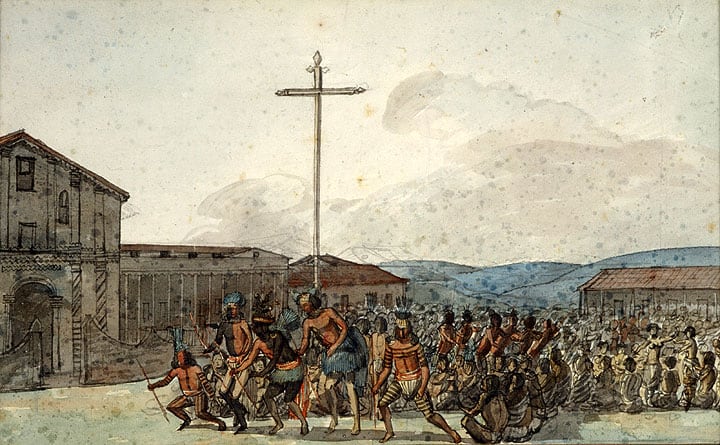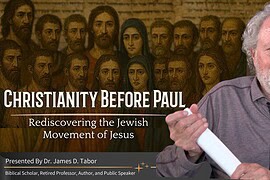The New Testament has been the most influential collection of documents in history. Taken by both commoners and those in power as the inspired and infallible “Word of God,” and interpreted ofttimes outside its historical context, its fateful influence has often emerged from single passages with far-ranging consequences:

And there is salvation in no one else, for there is no other name under heaven given among men by which we must be saved. Acts 4:12
This dogmatic affirmation, attributed to the apostle Peter and inspired by the Holy Spirit according to the author of the book of Acts, was directly addressed to those Jews who had not accepted Jesus as Messiah–in one fell swoop making obsolete the 2000 year old tradition of Abraham, Moses, and the Prophets. The “name” here referenced was, of course, the Lord Jesus Christ–by which everyone must now be “saved.” This verse, echoed by others in the New Testament, goes a long way toward supporting a kind of Christian hegemony that declares all other religious traditions–past or present–as either superseded or in error. Salvation through Jesus is now the only way humans can relate to their Creator. It is a small step from this “Jesus only” dogma to the Orthodox Catholic declaration of extra Ecclesiam nulla salus–“outside the Church there is no salvation.”
Today, of course, we live in a world in which the spirit of ecumenism and mutual respect and understanding is upheld by the more enlightened exponents of religious dialog across diverse and conflicting traditions. Nonetheless, those who pride themselves on “speaking only where the Bible speaks” still proudly wave this verse like a banner, threatening all who are not Christian–usually defined by conservative Evangelical standards–to hell, see “Is Jesus the Only Way to Heaven.” Indeed, this kind of thinking has been the fuel for misguided Colonialist “mission work” for centuries, often resulting in disease, death, and destruction. Sadly, countless souls who have grown beyond their conservative Christian upbringings–or even wholly cast off such ideas–nonetheless have struggled with a gnawing fear–what if such dogmas are true? The hold a verse like this can have on sincere people who are moving beyond such a narrow perspective is amazing.
Maybe it helps a bit to know that no academically trained biblical scholar would accept that Peter himself ever spoke these words and that the speeches in the book of Acts are universally agreed to be compositions of the unnamed author, traditionally called “Luke.” But these supercessionist claims run through the New Testament and subsequent early Christian literature–and they are even asserted posthumously into the mouth of Jesus.
The Lord Jesus will return with all his holy angels, in flaming fire, inflicting vengeance on those who do not know God and on those who do not obey the gospel of our Lord Jesus. They will suffer the punishment of eternal destruction, away from the presence of the Lord and from the glory of his might. (2 Thessalonians 1:8-9)
I am the Way, the Truth, and the Life, no one comes to the Father except through me. (John 14:6)
It is hard to imagine much room here for dialog, mutual respect, and understanding. Islam took more than a page from the New Testament in asserting its own version of supercessionist “one-up-man-ship,” declaring a plague on all houses. Unfortunately, the results of such religious dogmatism are much with us today in our military, political, social, and cultural conflicts.
The resulting scope of this “Jesus only” concept has been vastly expanded through “missionary” efforts. Paul sees the subjection of the entire human race to “Christ” as its ultimate goal and purpose:
So that at the name of Jesus every knee should bow, in heaven and on earth and under the earth, and every tongue confess that Jesus Christ is Lord, to the glory of God the Father. (Philippians 2:10-11)
This idea that the Christian gospel and the “Lordship of Jesus Christ” is to extend throughout the world–to every “nation, tribe, language, and people” has been seen as the bedrock pillar and presupposition of Christian evangelism through the centuries. The Christian message is not merely “one among many,” in a spirit of toleration and understanding of a world full of diverse and contradicting spiritual traditions. The universal goal of the proclamation of the Christian gospel is to bring all creation into subjection to Jesus Christ as Lord. Indeed, according to Paul, humanity is being divided into two camps by this Christian proclamation–“those who are being saved” and “those who are perishing” (2 Corinthians 2:15). One’s response to the offer of Christ as Savior is a “once for all” chance to avoid the wrath of God and eternal punishment.

This imperative, and this ultimate goal, as expressed here in Paul’s assurance of ultimate submission of “all things” to Christ, has fueled countless missionary ventures, often backed by the power of wealth and military might, that have tragically resulted in the repression, suppression, and even extinction of untold indigenous cultures and traditions, that were classified as “heathen,” and thus not worthy of survival. All too often such evangelistic efforts have resulted in the slaughter of the very ones who were supposedly being “saved.”









Comments are closed.